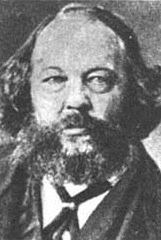May 30: Mikhail Bakunin
Mikhail Bakunin (1814)
It was on this date, May 30, 1814, that revolutionist and anarchist Mikhail Alexandrovich Bakunin (Михаи́л Алекса́ндрович Баку́нин) was born in the principality of Tver, modern Kalinin, Russia. He was born into a world of privilege, the son of an aristocratic family, but even as a young man developed radical ideas, especially after reading the French Encyclopedists. The French caught him and sent him back to Russia after he took part in the 1848-1849 revolutions in France and Saxony. The Russian government tucked him away in Siberia, but he escaped to London in 1861.
It was in London that Bakunin met and worked with Aleksandr Ivanovich Herzen (Алекса́ндр Ива́нович Ге́рцен), known to posterity as the "Father of Russian Socialism." Seven years later, Bakunin had become active in the First International and influenced its course with his anarchist ideas. But his ideas were not in agreement with those of Karl Marx, who got Bakunin expelled from the International. Bakunin believed that mankind is basically moral and that the state is evil. He wrote, in his 1871 tract, God and State,
A Boss in Heaven is the best excuse for a boss on earth, therefore, if God really existed, it would be necessary to abolish him. ... The first revolt is against the supreme tyranny of theology, of the phantom of God. As long as we have a master in heaven, we will be slaves on earth. ... God being everything, the real world and man are nothing. God being truth, justice, goodness, beauty, power, and life, man is falsehood, iniquity, evil, ugliness, impotence, and death. God being master, man is the slave. While Satan is the eternal rebel, the first freethinker and the emancipator of worlds. ... The idea of God implies the abdication of human reason and justice; it is the most decisive negation of human liberty and necessarily ends in the enslavement of mankind both in theory and practice. He who desires to worship God must harbor no childish illusions about the matter but bravely renounce his liberty and humanity.
Bakunin didn't completely disagree with Marx, however. He too thought religion was the sigh of the oppressed, and therefore the opium of the people, but he put it this way: "People go to church for the same reasons they go to a tavern: to stupefy themselves, to forget their misery, to imagine themselves, for a few minutes anyway, free and happy."
Being a true anarchist, not a Marxist or Communist, Bakunin thought Marx's class warfare idea was correct, but rejected Marx's authoritarian ideas of government – Bakunin thought any government divided society into masters and slaves – and Marx's would lead to totalitarianism. It would seem that history vindicated Bakunin, at least in the case of Soviet Russia. But Bakunin never lived to see it. He died in Berne, Switzerland on 1 July 1876.
Mikhail Bakunin once said, "The liberty of man consists solely in this, that he obeys the laws of nature, because he has himself recognized them as such, and not because they have been imposed upon him externally by any foreign will whatsoever, human or divine, collective or individual."
Originally published May 2003 by Ronald Bruce Meyer.


